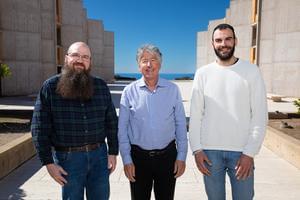LA JOLLA (March 4, 2024)—Charles Darwin described evolution as “descent with modification.” Genetic information in the form of DNA sequences is copied and passed down from one generation to the next. But this process must also be somewhat flexible, allowing slight variations of genes to arise over time and introduce new traits into the population.
But how did all of this begin? In the origins of life, long before cells and proteins and DNA, could a similar sort of evolution have taken place on a simpler scale? Scientists in the 1960s, including Salk Fellow Leslie Orgel, proposed that life began with the “RNA World,” a hypothetical era in which small, stringy RNA molecules ruled the early Earth and established the dynamics of Darwinian evolution.
New research at the Salk Institute now provides fresh insights on the origins of life, presenting compelling evidence supporting the RNA World hypothesis. The study, published in Proceedings of the National Academy of Sciences (PNAS) on March 4, 2024, unveils an RNA enzyme that can make accurate copies of other functional RNA strands, while also allowing new variants of the molecule to emerge over time. These remarkable capabilities suggest the earliest forms of evolution may have occurred on a molecular scale in RNA.










Leave a reply